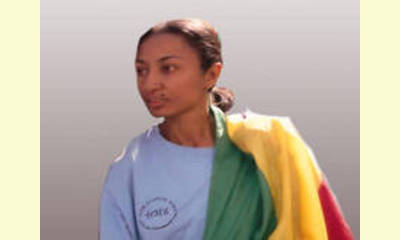|
|
Ethiopian journalist Reeyot Alemu wins 2013 UNESCO-Guillermo Cano World Press Freedom Prize
un articulo por UNESCO Media Services
Imprisoned Ethiopian journalist Reeyot Alemu is
the winner of the 2013 UNESCO-Guillermo Cano World
Press Freedom Prize. Ms Alemu was recommended by
an independent international jury of media
professionals in recognition of her “exceptional
courage, resistance and commitment to freedom of
expression.”

Ethiopian journalist Reeyot Alemu wins 2013 UNESCO-Guillermo Cano World Press Freedom Prize - (c) IWMF
click on photo to enlarge
The Jury took note of Reeyot Alemu’s contribution
to numerous and independent publications. She
wrote critically about political and social
issues, focusing on the root causes of poverty,
and gender equality. She worked for several
independent media. In 2010 she founded her own
publishing house and a monthly magazine called
Change, both of which were subsequently closed. In
June 2011, while working as a regular columnist
for Feteh, a national weekly newspaper, Ms Alemu
was arrested. She is currently serving a five year
sentence in Kality prison.
The UNESCO Guillermo Cano World Press Freedom Prize
was created in 1997 by UNESCO’s Executive Board. It
is awarded annually during the celebration of World
Press Freedom Day on 3 May, which will take place
this year in Costa Rica.
The Prize honours the work of an individual or an
organization which has made a notable contribution
to the defence and /or promotion of freedom of
expression anywhere in the world, especially if
risks have been involved. Candidates are proposed
by UNESCO Member States, and regional or
international organizations active in the fields
of journalism and freedom of expression. Laureates
are chosen by a jury whose members are appointed
for a once renewable three-year term by the
Director-General of UNESCO.
(Click here for a Spanish version of this article or here for a French version.
|








|
DISCUSSION
Pregunta(s) relacionada(s) al artículo :
The courage of Mordecai Vanunu and other whistle-blowers, How can we emulate it in our lives?
* * * * *
Comentario más reciente:
:
Whistle-blowers may be considered as very important actors for a culture of peace. As described on the CPNN page for values, attitudes and actions for a culture of peace, the culture of war is characterized by propaganda, secrecy, government control of media, militaristic language and censorship while the culture of peace is characterized by the free flow and sharing of information. Whistle-blowers break the back of secrecy directly and dramatically.
Mordecai Vanunu's courage continues the tradition of Daniel Ellsberg, who made known the Pentagon Papers during the Vietnam War and Karen Silkwood, who exposed nuclear pollution in the United States. Ellsberg was persecuted by President Nixon and Karen Silkwood was murdered, as described some years ago in a very fine film starring Meryl Streep.
As the amount of government secrecy continues to increase, we may expect that the number of whistle-blowers will also tend to increase in the years to come.

|
|









